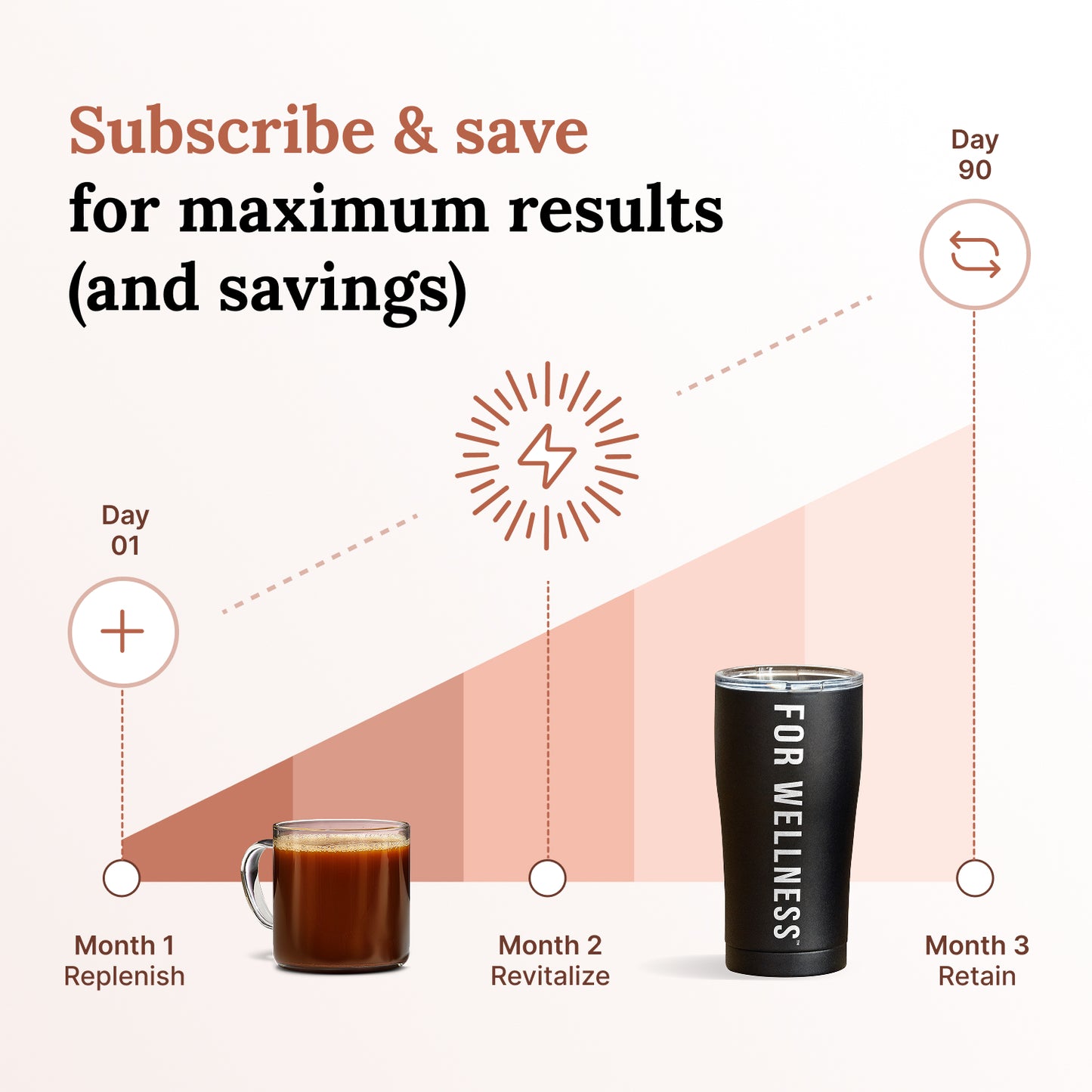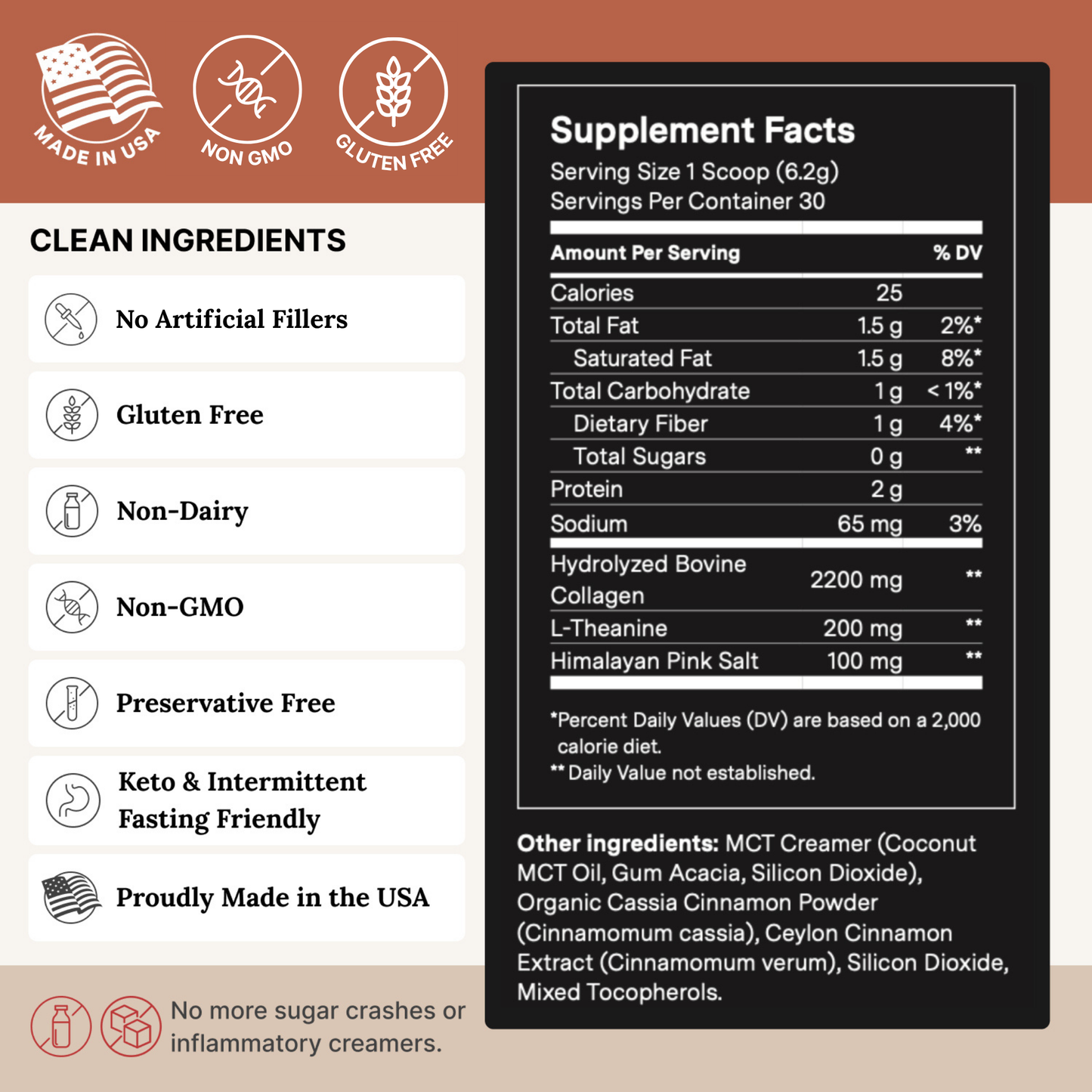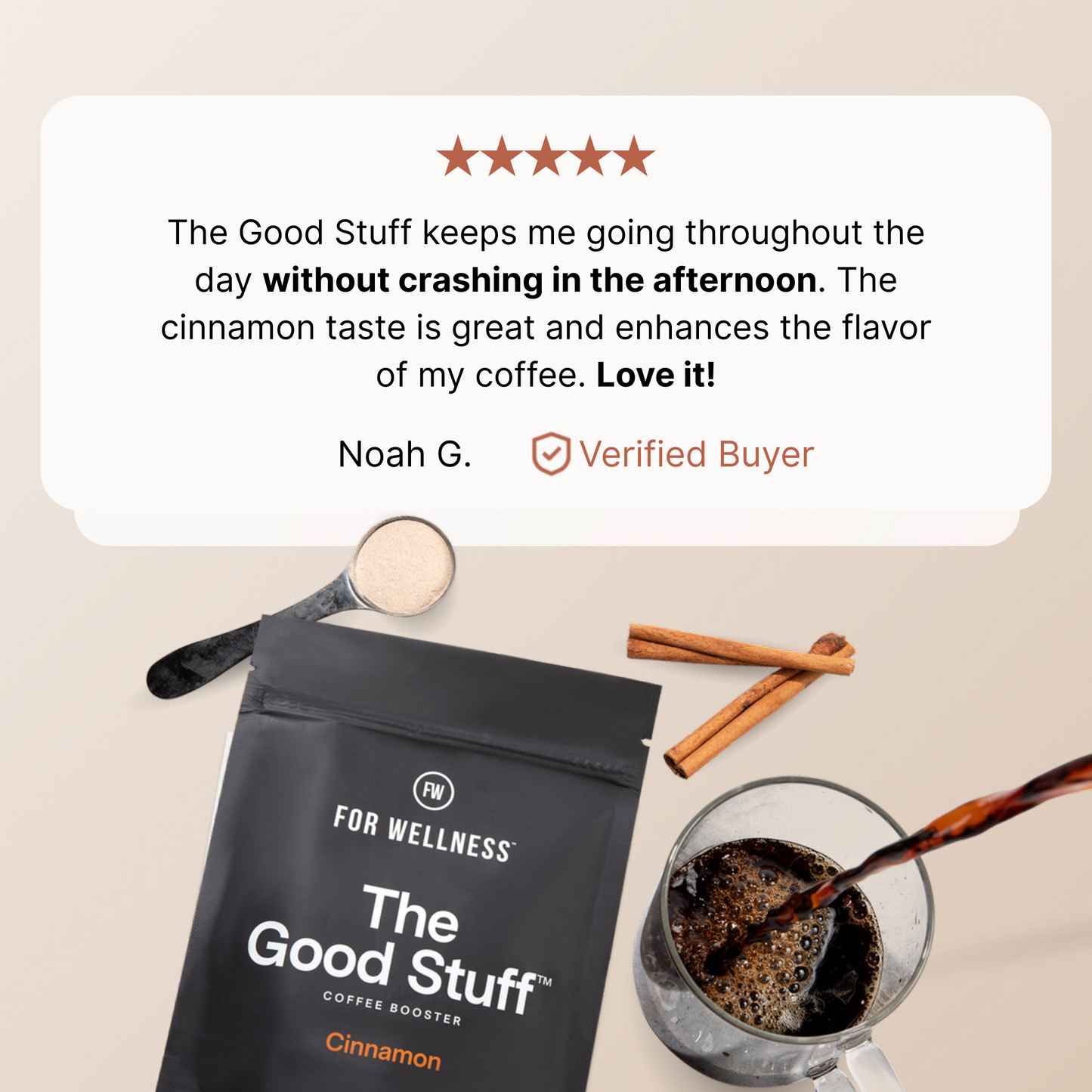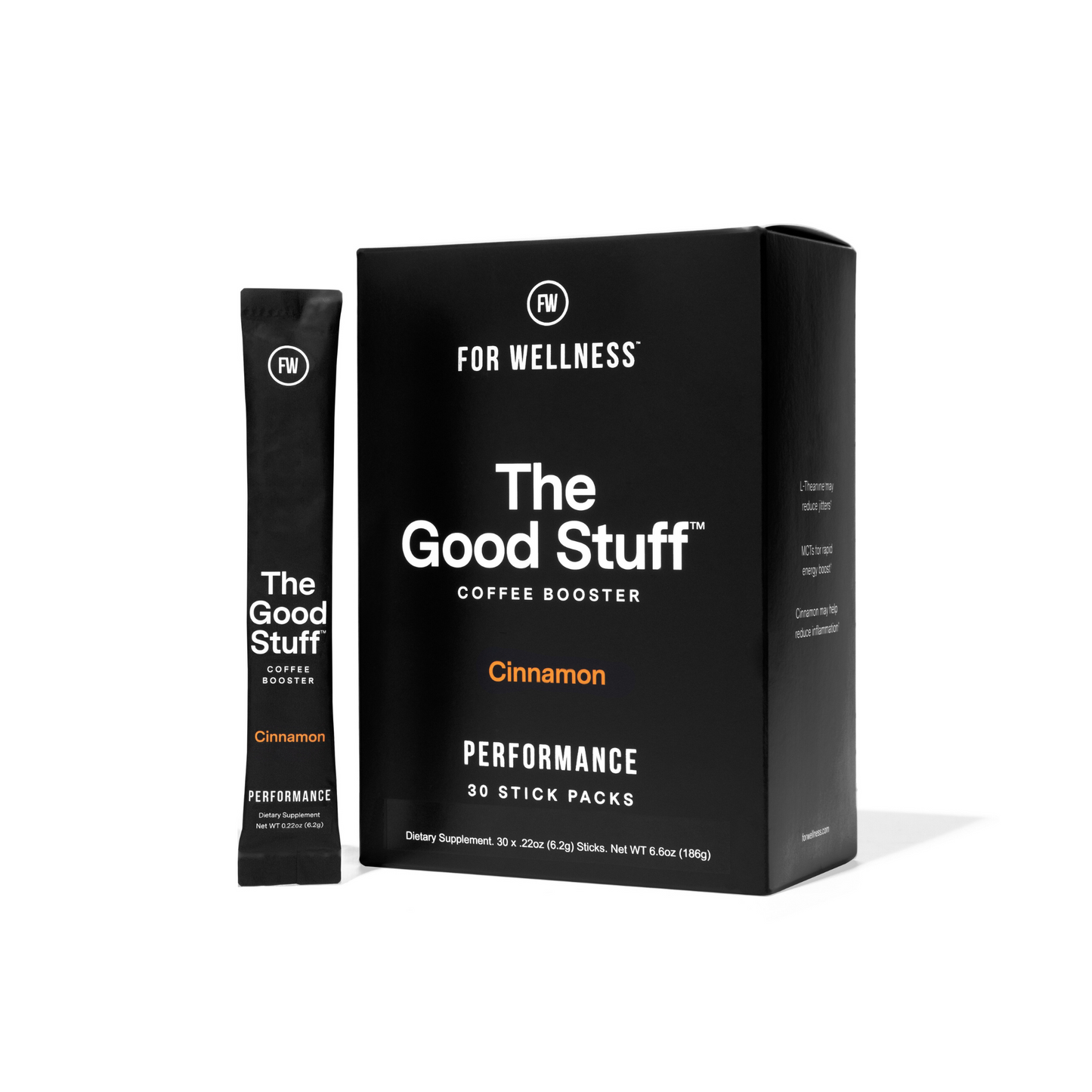Did you know that you can begin to see wrinkles appear as early as your 20s? While there are not many 20 years old with wrinkles, you might start noticing fine lines appearing as you get older.
The beauty industry has capitalized on this, and you'll find many "anti-aging" products when shopping for skincare products. However, did you know that there's a protein that can help reduce the signs of aging?
Adding collagen to your diet can help with signs of aging and keep your skin healthy. Are you looking for ways to increase the amount of collagen in your body? Your daily coffee could be the answer.
Keep reading to learn more about collagen and how adding it to your coffee can help you.


The Good Stuff - Performance
-
One scoop will infuse your coffee with healthy ingredients
-
Ditch the bad stuff like sugar, dairy, and artificial creamers
-
Fights inflammation and supports skin and joint health
-
Makes your coffee taste great
What Is Collagen?
Collagen is a protein that's dense, fibrous, and insoluble. You can find it in your skin, tendons, muscles, and bones.
Around 70 to 80 percent of your skin is made up of collagen. In addition, if you consider the total amount of protein in your body by weight, one-third of that weight consists of collagen.
Collagen plays a variety of roles in your body. There are 28 types of collagen in your body; however, the most common types of collagen in your body consist of three types. While every type of collagen is important to your health, these three types play significant roles, and that's why you'll commonly find them in supplements.
Type I
Type I collagen is the most abundant in your body. You'll find this type of collagen in your eyes, skin, hair, nails, ligaments, tendons, bones, blood vessels, and organs. It's believed this type of collagen can help with your skin quality and support and wound healing.
Type II
If you're looking to promote joint health and support your immune and digestive function, type II is the type of collagen you're interested in. You can find this type in your gut lining, joints, and cartilage.
One study took a look at a group of people with rheumatoid arthritis and increased the amount of type II collagen in their diet. Participants in the group who received collagen saw a decreased amount of inflammation and tenderness in their joints. However, what's important to note is that four patients entered complete remission.
Type III
You'll find this type of collagen in your organs, the structure of your muscles, and blood vessels. It's can help support healthy blood clotting and intestinal health, and it may help with the structure of your muscles.
This might not sound like a lot, but this type of collagen could be more important than you realize. One study looked at 14 patients who died due to ruptured aneurysms.
The study found that in six of the 14 patients that died from a ruptured aneurysm, there was a type III collagen deficiency.
How Does Your Body Get Collagen?
Collagen is one protein that your body produces naturally. However, there are different factors that can help with that production. For example, getting enough sleep and eating the right foods.
The building blocks of collagen consist of glycine, proline, and hydroxyproline. These are amino acids your body needs to create collagen.
What Causes a Collagen Deficiency?
You can experience reduced levels of collagen. In fact, reduced levels of collagen are common due to a variety of factors.
Diet
The reduced levels can be a result of a poor diet.
For example, sugar can impact your collagen levels. Sugar could make the fibers tangle and cross-link. When this happens, over time, your skin begins to lose its elasticity.
Lifestyle
Lifestyle can also play a significant role in your collagen levels. There are two lifestyle factors we want to really touch on here.
First, spending too much time in the sun, keep in mind this can also apply to tanning beds. The sun and tanning beds emit ultraviolet light. This ultraviolet light can make the fibers in collagen unravel.
This is where you can begin to experience sun damage, like wrinkles. However, it's important to remember that the sun provides some great benefits as well, like increasing your levels of vitamin D. You don't want to simply avoid the sun; increasing the amount of collagen in your body and wearing sunscreen are two ways to help with this.
The next lifestyle factor we want to touch on is smoking. Smoking has long been known to cause many health problems. However, it can also impact your appearance.
The chemicals found in cigarette smoke can damage the collagen in your skin. That's one of the reasons that smoking can speed up the signs of aging in your skin. Smokers will notice that their skin begins to wrinkle and sag earlier because their skin doesn't have the collagen it needs.
Age
One of the biggest culprits when it comes to reduced collagen levels is age. As you age, your body naturally produces less collagen. Beyond finding ways to increase your levels of collagen, there's nothing you can do about this.
Signs of a Collagen Deficiency
Do you need to worry about introducing more collagen into your diet? There are some signs that could indicate that adding collagen to your diet is a good idea.
Wrinkles and Sagging Skin
As mentioned above, as you age, your body naturally produces less collagen. These reduced collagen levels can lead o reduced skin elasticity.
If you're in your 20s and already worrying about wrinkles, this is something you want to check out. Keep in mind that reduced collagen levels aren't the only reason for sagging or wrinkled skin. However, it is a contributing factor you should be aware of.
When your levels of collagen are reduced, your body struggles to produce extra collagen and repair what it already has. Your body will begin to use the collagen it has for your vital organs and areas in need of urgent repair.
That's why you begin to see signs of wear and tear on your skin first.
Joint Pain and Aches
Are you beginning to experience joint pain as you age? We have a tendency to just assume that this pain is a natural part of getting older.
However, your joints need collagen, too, and reduced collagen can cause aches and pains. Cartilage is a connective tissue. It helps protect your joints and bones.
When you don't have enough collagen, your body can't rebuild or repair the cartilage in your joints. This cartilage helps give your joints flexibility and cushion because of its elasticity. If it doesn't have the ability to maintain that elasticity, your cartilage becomes vulnerable to damage.
You'll also find collagen in your tendons, ligaments, and bone structures. If these parts of your body aren't getting enough collagen, they won't be able to repair themselves and allow you to keep up with life. Instead, you'll struggle with joint pain and inflammation.
Muscle Pain and Slow Post-Workout Recovery
If you're an athlete, it can become more difficult to recognize muscle aches and pains from a hard workout vs. soreness from a collagen deficiency. However, if you're experiencing long recovery times after working out, it could be due to not having enough collagen.
When you use your muscles during exercise, you experience tiny tears in the fabric of your muscles. You need collagen to help repair these tears.
Reduced collagen can lead to a longer healing time and a loss of muscle mass.
GI Problems
Have you been diagnosed with a leaky gut? A leaky gut causes gaps in your intestinal lining. These gaps allow bacteria and toxins to get into your bloodstream.
To some degree, you should have openings in your intestines. However, the openings should only be there to give your body the ability to absorb nutrients. When those gaps become larger, it can change your gut health and cause infection and inflammation.
Collagen plays an important role in your gut. You need it to help repair your intestinal walls. When you don't have enough, it can't do the job it's meant to do.
Slow Injury Recovery
Collagen plays a critical role in wound healing. There are essential nutrients encouraged when you're healing from surgery or an injury. Some of these nutrients help promote the production of collagen.
If your body doesn't have enough collagen, it will struggle to heal the damaged tissue.
Benefits of Adding Collagen to Your Coffee
There's some debate over whether or not adding collagen to your coffee really works. Some people claim that the heat of the coffee degrades it and doesn't allow it to give you the benefits you're looking for.
However, what we're getting ready to tell you is important because they're not telling you the full story.
Collagen does begin to degrade in supplements at high temperatures. Fortunately, the temperature of your daily coffee is far below that temperature.
The average up of coffee is around 160 to 185 degrees Fahrenheit. Collagen does not begin to degrade until around 572 degrees Fahrenheit. If you're drinking coffee at that heat, you're going to quickly burn your tongue.
Adding collagen to your coffee is an easy way to boost your levels and reap the benefits. There are many benefits of adding it to your coffee.
It Tastes Good
When you add The Good Stuff, it infuses your coffee with collagen and other healthy ingredients and makes it taste great. It doesn't feel like you're taking a supplement. Instead, it feels like you're adding flavor and keeping your coffee healthy.
Help Your Liver Get Rid of Toxins
Your liver plays a very important role in your body. When blood leaves your stomach and intestines, it passes through your liver. The liver's job is to then process it and break it down, balance it, and create nutrients.
Your liver also works to metabolize drugs so that your body can use them and they're not toxic.
On its own, coffee can have some excellent benefits for your liver. When the caffeine passes through, a chemical called paraxanthine gets created.
This chemical helps slow the growth of scar tissues that come with fibrosis. Slowing that growth can help your liver fight against hepatitis C, non-alcohol-related fatty liver disease, alcohol-related cirrhosis, and liver cancer.
There are also two chemicals in your coffee that might help fight against cancer. These chemicals are called cafestol and kahweol.
Finally, the acids in coffee can help against the virus that causes hepatitis B. There are many benefits for your liver when you drink coffee, but adding collagen can boost those benefits more.
Collagen is rich in amino acids, including glycine. Because your liver handles a high volume of toxic substances, it's important to protect it against damage. Glycine can help guard your liver against that damage.
Improve Symptoms of Leaky Gut and Other GI Issues
Some people with leaky gut find that drinking coffee can actually make the symptoms worse. If consuming caffeine makes your symptoms worse, keep this in mind.
However, adding collagen to your coffee can help increase the levels available in your body. This can give your body the ability it needs to begin healing the lining of your intestines.
Healing the lining of your stomach can help you avoid the problems that come with hormone imbalances, digestive problems, and autoimmune disorders.
Improve Your Digestion
Problems with digestion can significantly impact your life. However, drinking coffee and adding collagen to your coffee can help with digestion.
When you drink coffee, it stimulates the movement of the muscles in your colon. This causes wave-like muscle contractions. These contractions help move food through your digestive tract.
This is why many people experience a bowel movement shortly after drinking their coffee. This movement helps improve excretion and digestion.
Adding collagen also helps protect the mucosal lining of your digestive system. This helps your body absorb the good nutrients it needs from your food and helps with digestion.
Stronger Skin, Hair, and Nails
If the inside of your body isn't healthy, you can see it on the outside. The amino acids in collagen help keep your skin, nails, and hair nourished. This is because it renews your cells and gives the needed elasticity and lubrication.
Without it, your hair and skin will become dry and brittle. In addition, as we discussed earlier, collagen can help prevent wrinkles and fine lines.
If you're concerned about early signs of aging, adding collagen to your coffee is an easy way to get the supplements you need. Drinking coffee on its own is also good for your skin, hair, and nails.
It provides nutrients and antioxidants that can help keep your body healthy. However, drinking too much coffee can have a negative impact. It's important to remember that there is such a thing as too much of a good thing.
Calm Down Aches and Pains
Around 24 percent of Americans struggle with arthritis. In fact, it's one of the leading causes of work disability. We referenced a study earlier that talked about individuals with rheumatoid arthritis going into remission after increasing the amount of collagen in their diet.
With the growing numbers of people with arthritis, it's important to find solutions for this debilitating disease. Adding collagen to your coffee can help reduce joint inflammation and prevent aches and pains that just come with normal aging.
However, collagen doesn't work alone in your coffee. Coffee actually has anti-inflammatory properties. This means that the coffee and collagen can work together to decrease the inflammation that's causing your pain.
Prevent Bone Loss
Collagen gives your bones structure and strength. As you age, collagen in your body deteriorates. However, it's not the only thing; you can also begin to lose bone mass and end up with conditions like osteoporosis.
This puts you at higher risk for fractures. However, collagen can help stop the breakdown that causes this disease. One study looked at women who were post-menopausal.
The women took vitamins and collagen supplements. The women who took the collagen supplements had lower levels of the protein that promotes bone breakdown. This isn't the only study; there are many promising studies looking at the impact of collagen supplements on bone health.
Boost Muscle Mass
Collagen is an integral part of your muscles. As you age, it's possible to begin to lose muscle mass. This can lead to a condition called sarcopenia.
One study looked at 27 older men with sarcopenia. During the course of the study, there were two groups. Both took 15 grams of collagen daily. However, one group paired that with an exercise program.
The men who paired collagen with an exercise program gained a significant amount of strength and muscle mass.
Promote Heart Health
Cardiovascular diseases impact almost half of Americans. It's a significant problem brought on by diet, genetics, and a range of lifestyle factors.
Collagen plays an important role in your arteries. Your arteries carry blood from your heart to the rest of your body, making the health of your arteries vital. Your arteries need to maintain a certain level of elasticity and flexibility.
Without that, you can experience atherosclerosis. This disease is characterized by narrowed arteries and can lead to heart attack and stroke.
One study took a group of healthy adults and had them take 16 grams of collagen every day. The participants in the study saw a couple of positive effects.
First, the amount of artery stiffness they had was significantly reduced at the end of the study. Next, participants saw their HDL levels increase by an average of six percent.
HDL is good cholesterol, and that rise can help decrease the risk of heart disease.
A Fun and Tasty Way to Add Collagen to Your Coffee
Adding collagen to your coffee doesn't need to be boring or taste bad. In fact, it shouldn't be.
The best way to add collagen to your coffee is by keeping it simple and adding The Good Stuff. It doesn't need to be anything elaborate or fancy. In fact, skipping the creamers and sugars makes your coffee healthier.
The Good Stuff comes with performance-packed ingredients that make your coffee one of the best things you'll put in your body. Each of these ingredients comes with a range of benefits, and we'll touch on what's in it and just a few of the benefits.
Collagen
We discussed the benefits of adding collagen to your coffee above. However, we can't overstate these benefits. You'll find collagen in The Good Stuff because we know how important it is.
L-Theanine
This naturally occurring amino acid is generally found in tea. It helps reduce stress and promote relaxation.
If you experience jitters from caffeine, this is the perfect pairing for your coffee. It can help reduce those jitters.
Ceylon Cinnamon
Not only does cinnamon taste great, but it has a variety of health benefits. It also has some benefits for your bones and lowers the risk of disease.
MCT Oil
If you're looking to enter ketosis and burn fat, this oil can help. It's a healthy fat in coconut oil. It can enhance ketosis because it has the ability to instantly convert into ketones in your body.
Himalayan Pink Salt
Do you want to reduce the acidity of your coffee? Himalayan pink salt is the perfect solution. It reduces acidity and smooths out the flavor.
It can also help improve your skin and reduce muscle cramping.
Start Adding Collagen to Your Coffee
Adding collagen to your coffee is a great way to increase your levels of collagen. This can help prevent wrinkles, reduce aches and pains, improve heart health, improve digestion and gut health, and more.
The simplest way to add collagen is by adding The Good Stuff to your daily cup of coffee.















